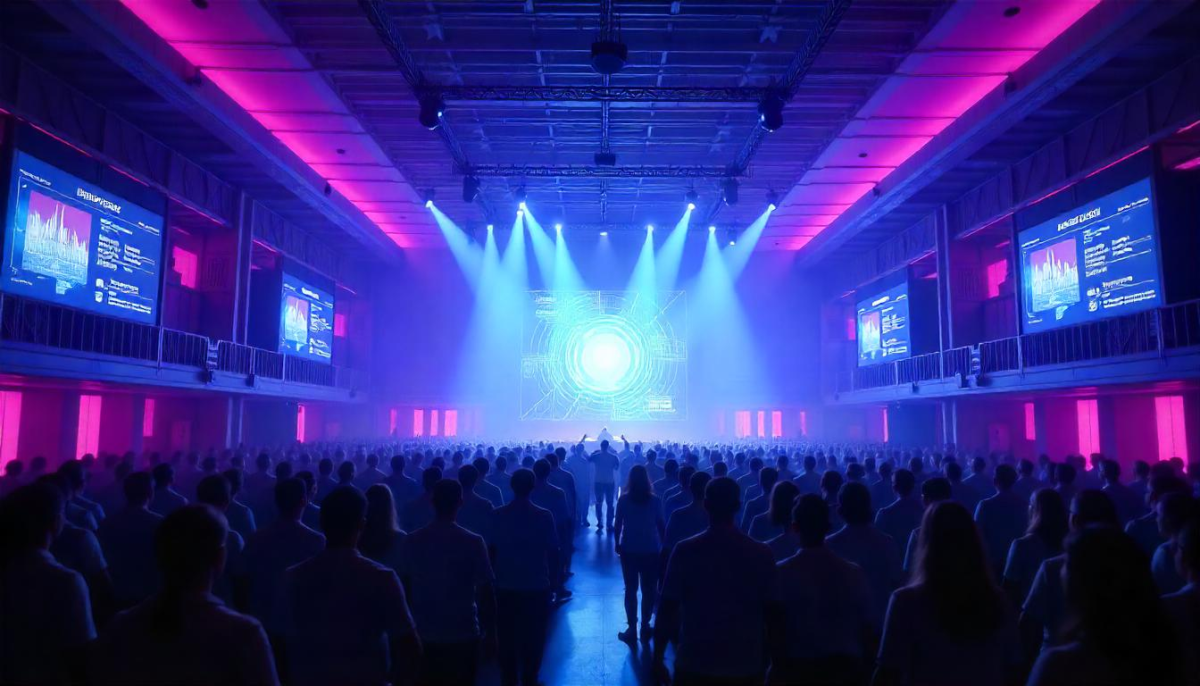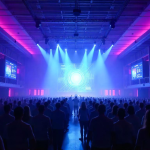The live music industry has undergone a seismic shift since 2020, with technology emerging as the driving force behind a new era of concert experiences. According to recent industry data, Live Nation saw a 36% increase in revenue from 2022 to 2023, with an adjusted operating income (AOI) up double from even pre-pandemic numbers, signaling not just recovery but unprecedented growth powered by technological innovation.
The pandemic didn't just pause live music—it accelerated a digital transformation that was already brewing beneath the surface. Venues that once relied on outdated systems and manual processes suddenly found themselves racing to adopt music venue management software and cutting-edge technologies to survive and thrive in this new landscape.
The Technology Revolution Reshaping Music Venue Management Software
The shift toward tech-enabled venues represents more than just catching up with the times. It's about fundamentally reimagining what live music experiences can be. Venues are no longer just physical spaces where artists perform; they're becoming smart, data-driven ecosystems that enhance every aspect of the fan journey.
Throughout 2025, we're seeing more innovative and interactive live events, incorporating the latest technologies and marketing strategies to enhance fan engagement and brand promotion. This evolution is being driven by changing consumer expectations and the competitive pressure to deliver experiences that stand out in an increasingly crowded entertainment landscape.
Modern venues are integrating sophisticated technologies that were once exclusive to major corporate events or high-end facilities. From AI-powered crowd management to real-time analytics platforms, the tools available to venue operators have become more accessible and powerful than ever before.
Breaking Down Digital Barriers
The traditional boundaries between venue management tasks are dissolving as integrated platforms replace the patchwork of spreadsheets, emails, and disconnected software that once defined venue operations. This consolidation isn't just about convenience—it's about creating seamless workflows that reduce errors, save time, and ultimately enhance the live music experience for both operators and fans.
Key Technologies Reshaping the Live Music Experience
Today's most successful venues are embracing a diverse array of technologies that work together to create immersive, efficient, and profitable experiences. Here are the game-changing innovations making the biggest impact:
1. Interactive Wearable Technology
The world's most popular concerts are leveraging wearable technology to make a more interactive live music experience. Take, for instance, The Taylor Swift Eras Tour; thousands of attendees are given wristbands at the start of the show to layer crowd-based lighting effects throughout the concert. These devices transform audiences from passive observers into active participants in the performance.
2. Hybrid Event Capabilities
Virtual streaming technology has become a permanent fixture in the venue landscape. Statista found that as of August 2020, 73% of music fans had watched a live stream, while 60% said they plan to continue watching live streams after in-person concerts return. This dual-format approach allows venues to reach global audiences while maintaining intimate in-person experiences.
3. AI-Powered Personalization
The rise of AI-powered music composition tools is revolutionizing the way artists create music. These tools can assist in generating unique melodies, harmonies, and arrangements, providing a new level of creative support. Beyond creation, AI is enhancing venue operations through predictive analytics, dynamic pricing, and personalized marketing campaigns.
4. Sustainability Technologies
Environmental consciousness has become a priority for venues and fans alike. Venues are increasingly powered by renewable energy sources, with solar-powered stages and advanced battery storage systems becoming standard features at major events. Smart systems monitor resource usage in real-time, helping venues reduce their environmental footprint while cutting operational costs.
5. Mobile-First Solutions
One of the top event technology trends in 2023 will be a rise in native mobile technologies and mobile apps for events. The primary benefit of these technologies is that they are self-service by design, so attendees can access all the information and tools they need from the convenience of their phones. This shift toward mobile accessibility extends to venue management platforms, enabling operators to manage their facilities from anywhere.
The Business Impact of Smart Venue Management
The integration of advanced technologies isn't just about creating flashy experiences—it's fundamentally changing how venues operate as businesses. The financial benefits of adopting comprehensive music venue management software extend far beyond simple cost savings.
Venues leveraging integrated management platforms report significant improvements in operational efficiency. Automated booking processes eliminate the time-consuming back-and-forth of traditional scheduling, while real-time financial tracking provides unprecedented visibility into revenue streams and expenses.
Operational Efficiency Gains
Modern venue management systems consolidate dozens of previously separate tasks into unified workflows. Instead of juggling multiple spreadsheets, email chains, and software platforms, venue operators can manage everything from hold requests to final settlements in a single environment. This consolidation reduces the risk of errors, miscommunication, and missed opportunities that can plague traditional venue operations.
The impact on productivity is measurable. According to industry surveys, venue employees spend between one and four hours daily on booking and ticketing alone. Venue management automation and integration can cut this time dramatically, freeing staff to focus on revenue-generating activities and relationship building.
Enhanced Financial Visibility
Real-time financial reporting capabilities provide venue managers with instant access to critical business metrics. Instead of waiting weeks for financial reports, operators can track ticket sales, monitor expenses, and calculate profit margins in real-time. This immediate visibility enables faster decision-making and more agile responses to market opportunities.
Advanced platforms also provide predictive analytics that help venues optimize pricing, forecast demand, and identify trends that might not be apparent through traditional reporting methods. These insights become increasingly valuable as venues compete for both artists and audience attention in a crowded marketplace.
Music Venue Management Software: The Central Hub of Modern Operations
At the heart of this technological transformation lies comprehensive music venue management software that serves as the central nervous system for modern venue operations. These platforms go far beyond basic calendar management to provide integrated solutions for every aspect of venue business.
The evolution of venue management technology reflects the industry's growing sophistication. Early systems focused primarily on scheduling and basic contact management. Today's platforms integrate financial management, collaborative tools, marketing capabilities, and advanced analytics into seamless experiences that scale with venue growth.
Core Capabilities That Drive Success
Modern music venue management software platforms address the unique challenges faced by live music venues. Unlike generic event management tools, these specialized solutions understand the complexities of artist relations, tour logistics, and the rapid-fire decision-making required in the live music business.
Centralized calendar management enables venue operators to track holds, confirmed shows, and available dates across multiple rooms or stages. Color-coded systems provide instant visual clarity, while automated hold reports eliminate the manual work of creating availability documents for agents and promoters.
Financial tools built specifically for the live music industry handle the unique aspects of show settlements, including complex revenue sharing arrangements, expense tracking, and the various fees and percentages that characterize music industry deals. Integration with ticketing systems provides real-time revenue tracking that helps venues optimize pricing and identify profitable opportunities.
Collaboration and Communication Features
The live music industry thrives on relationships, and modern venue management platforms reflect this reality through sophisticated collaboration tools. Instead of relying on email chains and phone calls, venues can manage all stakeholder communications within integrated platforms that maintain historical records and ensure nothing falls through the cracks.
These systems enable venues to grant different access levels to various stakeholders, ensuring that agents see relevant booking information while protecting sensitive financial data. The ability to share specific information with specific people at specific times reduces confusion and builds trust among all parties involved in bringing shows to life.
Task management features help venue teams stay organized and accountable. Automated reminders and deadline tracking ensure that critical tasks like technical riders, catering arrangements, and security coordination happen on schedule, reducing the stress and last-minute scrambling that can characterize venue operations.
Looking Ahead: The Future of Venue Technology
The technology trends reshaping live music venues today are just the beginning of a longer transformation that will continue evolving throughout 2025 and beyond. Venues that embrace these changes position themselves not just for survival but for significant competitive advantages in an increasingly sophisticated marketplace.
Recent industry data shows the global live music market reached over 33 billion U.S. dollars in 2023, representing a 25 percent increase from the previous year. Industry projections suggest this upward trajectory will continue, potentially surpassing 50 billion dollars by 2030. This sustained growth creates opportunities for venues that can efficiently scale their operations and deliver exceptional experiences.
Artificial intelligence will play an increasingly important role in venue operations, from predictive maintenance of equipment to dynamic pricing optimization based on real-time demand signals. Machine learning algorithms will help venues understand their audiences better, enabling more targeted marketing and personalized experiences that drive loyalty and repeat attendance.
The Competitive Imperative
As technology becomes more accessible and customer expectations continue rising, the question for venue operators isn't whether to embrace these innovations—it's how quickly they can implement them. Venues that cling to outdated systems risk being left behind as artists and audiences gravitate toward facilities that offer seamless, technology-enhanced experiences.
The most successful venues of the next decade will be those that view technology not as a necessary evil but as a strategic advantage. They'll use music venue management software to streamline operations, data analytics to understand their markets, and emerging technologies to create memorable experiences that keep fans coming back and artists eager to perform.
Moving to the Beat of Live Music
The evolution of venue technology represents more than just an upgrade to existing systems—it's a fundamental reimagining of what live music venues can accomplish. From AI-powered personalization to sustainable operations and seamless fan experiences, technology is enabling venues to operate more efficiently while delivering better experiences for artists and audiences alike.
The venues that will thrive in this new landscape are those that embrace music venue management software as the foundation for their operations. These platforms don't just automate existing processes; they enable entirely new ways of thinking about venue management, from real-time decision-making to data-driven strategy development.
The future of live music belongs to venues that can seamlessly blend cutting-edge technology with the timeless magic of live performance. By implementing comprehensive management platforms that streamline operations and enhance experiences, venue operators can focus on what they do best: creating unforgettable moments that bring artists and fans together.
Ready to transform your venue operations with technology built specifically for the live music industry? Get started with Prism and discover how the right management platform can revolutionize your venue's efficiency, profitability, and fan experience.
Frequently Asked Questions
Q: How much can music venue management software really improve operational efficiency? A: Industry data shows that venue employees typically spend 1-4 hours daily just on booking and ticketing tasks. Comprehensive management platforms can reduce this time by 60-70% through automation and integration, freeing staff for revenue-generating activities and relationship building.
Q: What's the typical ROI timeline for implementing venue management technology? A: Most venues see measurable returns within 3-6 months through reduced labor costs, fewer booking errors, and improved financial visibility. The time savings alone often justify the investment, with additional benefits from better decision-making and increased booking efficiency.
Q: Can small venues afford the same technology that major venues use? A: Yes, cloud-based platforms have democratized access to sophisticated venue management tools. Modern solutions offer scalable pricing models that make advanced features accessible to venues of all sizes, from intimate clubs to major arenas.
Q: How do integrated platforms handle the complexity of music industry financial arrangements? A: Specialized music venue management software is designed specifically for industry complexities like percentage deals, variable expenses, and settlement calculations. These platforms automate calculations that would otherwise require hours of manual work and reduce errors in financial reporting.
Q: What should venues prioritize when selecting management software? A: Focus on platforms built specifically for the live music industry, as they understand unique requirements like tour logistics and artist relations. Key features should include integrated calendar management, financial tools, collaboration capabilities, and mobile accessibility for on-the-go management.




